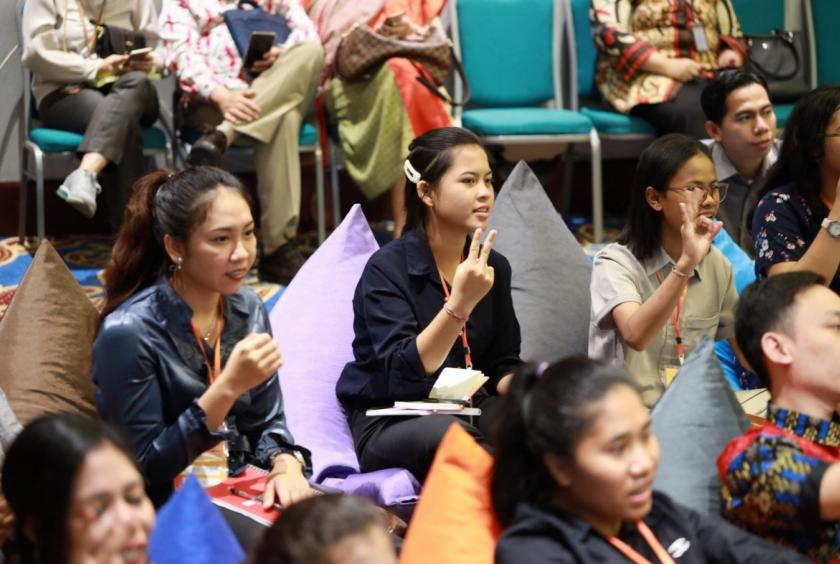Popular Reads
Top Results
Can't find what you're looking for?
View all search resultsPopular Reads
Top Results
Can't find what you're looking for?
View all search resultsBreaking the stagnation: Conference aims to open discourse on Indonesia’s family planning program
Change text size
Gift Premium Articles
to Anyone
I
ndonesia’s family planning program, once the nation’s pride, suffered a critical setback and stagnated following the implementation of decentralization in 2001.
The First International Conference on Indonesia Family Planning and Reproductive Health (ICIFPRH), which is set to open on Monday and run until Oct. 2 in Yogyakarta, aims to breathe new life into the program by bringing together some 800 participants from seven countries, including Egypt, Laos and Nepal.
“We want to open up a discourse that family planning is not just about population growth, but in the short and long term, it plays a crucial role in producing better human capital,” the conference’s chair, Siswanto Agus Wilopo, who is a professor at Gadjah Mada University's (UGM) Center for Reproductive Health, said on Saturday.
A number of pre-conference events, taking place on Saturday and Sunday, include the Youth Conference, the Teacher Champions of Sexual Reproductive Health Rights (SRHR) Summit and Qualitative Research Training on Family Planning and Reproductive Health.
The central government-backed family planning program enjoyed a golden era from the late 1970s to 2001, the time when it suffered a serious setback after the implementation of decentralization – causing the outstanding Contraceptive Prevalence Rate (CPR) of 60 percent that halved the Total Fertility Rate (TFR) from 5.2 to 2.6 per woman – to stagnate for almost two decades.
At the conference, scholars, health and development experts, policymakers, UN agencies, donors, civil society groups as well as youth and student leaders, will discuss ways to advance family planning and reproductive health programs in Indonesia. Other key stakeholders include community and religious leaders.
Other important issues to be discussed include child marriage, unwanted pregnancies and childbirths among adolescents (aged between 15 and 19).
The conference also aims at providing a national and international platform to start discussing how family planning and reproductive health programs in Indonesia can contribute to reducing maternal and child mortality rates.
Indonesia’s maternal mortality rate (MMR) remains high at 305 per 100,000 live births in 2018/2019, said Meiwita Budhiharsana, professor of public health at the University of Indonesia (UI), who also chairs the ICIFPRH’s Scientific Committee, in a statement.
Indonesia failed to achieve the Millennium Development Goal (MDG) of reducing maternal mortality to 102 deaths per 100,000 live births by 2015. Last year, the government said it would give it a second try, this time through the Sustainable Development Goals (SDGs) – and the bar is now set even higher as the SDGs aim to reduce global maternal mortality to only 70 deaths per 100,000 live births by 2030.
“We look forward to meeting the ideas, thoughts, work practices in the field, and policies, which are represented by the presence of academics, researchers, field workers, NGOs and policymakers both nationally and internationally,” explained Amala Rahmah, representative of Rutgers WPF Indonesia, who is the conference’s executive director.
The conference was initiated by a consortium called A Champion of Indonesia Family Planning and Reproductive Health, whose members include nongovernment institutions, universities and civil society groups, such as the United Nations Population Fund (UNFPA), Rutgers Indonesia, Johns Hopkins Center for Communication Program, UI’s School of Public Health, UGM’s Center for Reproductive Health, ThinkWell and the Indonesian Planned Parenthood Association (PKBI).
The conference – which is expected to be held every two years, carrying different themes – is jointly organized in partnership with the Indonesian Health Ministry and the National Population and Family Planning Board (BKKBN).
Fitri Putjuk, country representative of the Johns Hopkins Center for Communication Program (JHCCP) Indonesia, said the conference would serve as a place for presenters and participants to interact and discuss initiatives that have been or are being conducted so that the family planning, maternal and child health and welfare programs in Indonesia will advance despite today’s challenges and future needs.
“Let us learn from the past, and focus on the present and the future. The past is simply a lesson, but it should not be the main issue,” she said.











